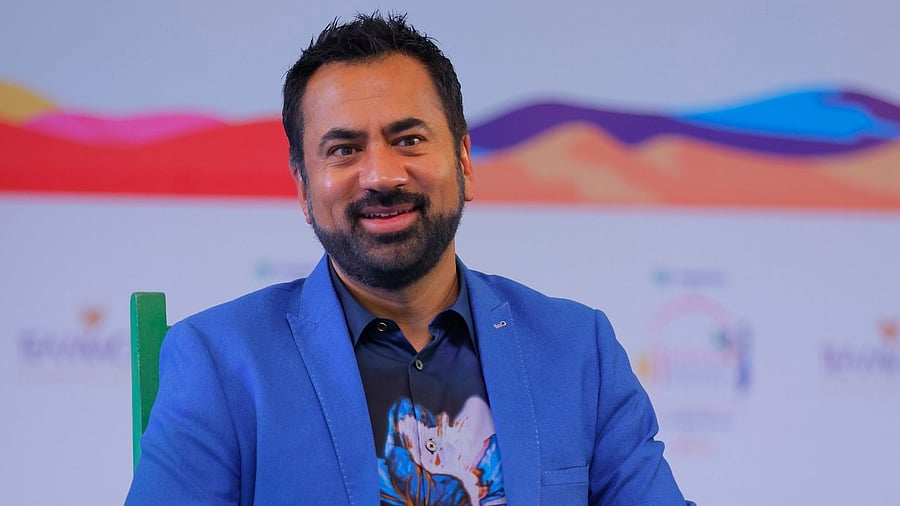
Kal Penn.
Credit: Jaipur Literature Festival.
“Being different wasn’t something I wanted to draw attention to. I didn’t need to be one of the cool kids — but I did want to blend in.”
These sentences are from the first chapter of the Indian-American actor of the Harold & Kumar franchise fame Kal Penn’s memoir You Can’t Be Serious (Gallery Books, 2021). They signal a sort of tension that Penn felt while growing up brown and coming to terms with his sexuality. In a conversation with DHoS at the Jaipur Literature Festival, he reflects on this tension and Trump’s second term. Edited excerpts:
The title of your book suggests humour’s role in your life. But it is serious, the need to belong. How did you then avoid the discriminatory structures not taking the better of you, in real life and this book?
The title was meant to be half-jokey and half-aspirational. When I said I wanted to be an actor, whether it was family, friends or folks in the industry, they were like, ‘You can’t be serious’. Same reaction when I wanted to go work in government. But I think that’s how people react anytime to anybody who wants to do something outside of the box. But one of the things that I love is that any and everything is possible in India and America, so I went for it. However, I must say that I didn’t have this memoir in me when I was 15 or 25. But now, I’ve several stories to tell that are funny and self-deprecating yet also full of hope, triumph and opportunities.
You alluded to the hurdles: if there weren’t any, then everybody would do everything all the time. It’s one of those things that makes you stronger. However, it wasn’t without the support of people — of my fans who supported my movies, TV shows, and the book. I’m grateful for that. With this book, I wanted to do what Mindy Kaling and Tina Fey did with their books. I hope that people read (my book) on the train or at the pool, and laugh their heads off but still find meaning in it.
It was in the fourth grade when you realised your “brain works differently” than others. Alongside exploring the predominant tangent of sexuality, how isolated did you feel while growing up brown in America?
That’s a very thoughtful question. When I was nine years old, I realised my brain was just very different from my other classmates. My teachers would always say, ‘He daydreams too much’. [Laughs.] The stories I made up were sick. But it’s just who you are, right? In terms of identity, whether it’s sexuality or anything else, there’s no timeline for that. Some kids would know by five while others like myself would know in their 20s.
You mentioned being a brown kid in America — growing up in the ’80s and ’90s, there weren’t a lot of faces who looked like mine on the TV. Now, even in our (Indian-American) communities, there was this opposition to pursuing a career in the arts, so one didn’t feel supported in one’s community. And it doesn’t necessarily feel supportive in the entertainment industry either. But there were people I could rely on.
Then, I had the blessing of going to a publicly funded performing arts high school. Had that not been the case, I don’t think I would’ve gotten the push to convince myself about this profession. Interestingly, when I was fact-checking things with my parents, I asked them how embarrassed they were on a scale of one to 10 when I was choosing this career. They said, ‘What? We were never embarrassed. We were scared, though.’ To my mind, they were embarrassed the whole time, but they said they were scared because as immigrants, they didn’t know that this was a career one of their own could have. And I think that contextualised a lot that I was a strong-headed, annoying drama kid who knew what he wanted to do. Navigating that path is different for everybody, and I’m very blessed to have experienced what I did.
Given that Trump has been re-elected, how increasingly difficult is it going to be for marginalised people, especially LGBTQIA+ people?
It’s still very early to say. If you look at the media, in the last decade, technology has changed the way we consume things. There’s so much diverse content on Netflix, Amazon, Hulu, and other OTT platforms. It’s not just that they benefit from performers of colour, but it really benefits American consumers no matter what they look like or where they are. Whether in New York or Alabama, you’re watching and enjoying the same things because you enjoy good writing and good shows.
In a way, it’s proven that diversity, equity, and inclusion (DEI) really makes us all stronger and America more competitive … it brings a lot of cohesion. I’m hopeful that at least the entertainment industry continues to support artistes from all backgrounds. And I’m not the type of person who feels threatened by somebody who disagrees with me. I’d love to hear disagreements. The role of a good artiste is to have a lively debate.